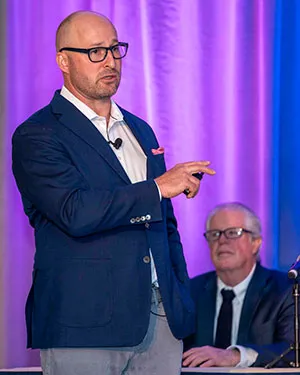Trucking Leaders Discuss Industry Trends, Key Concerns

[Stay on top of transportation news: Get TTNews in your inbox.]
PHOENIX — Operational costs, safety, security and regulatory requirements are top of mind for fleets, and stakeholders shared the latest information on issues affecting the trucking industry during American Trucking Associations’ Safety, Security and Human Resources National Conference and Exhibition.
Carriers are facing increasing costs in several areas, including insurance and driver pay. Chad Krueger, vice president and managing director of insurance at Fusable Risk Intelligence, said the insurance industry is under pressure from litigation costs, catastrophic losses and weather-related disasters, which are all becoming more expensive.
“Social inflation is compounding with accident volumes to drive up total loss cost,” he explained.
In response, insurance carriers are raising rates.
“The insurance carriers are trying to get back in the black. A 110% or 115% loss ratio is not uncommon,” Krueger said, adding that insurance carriers are trying to ingest as much data as possible to try and get ahead of losses.

There is an increasing appetite for self-insurance and captive groups. However, it can be challenging to get into a captive group.
“Those are carriers that are vetted and doing a very good job with their safety,” Krueger explained.
MORE FROM THE CONFERENCE: Technology Tools Help Carriers Reduce Risk, Improve Safety
Fusable’s data shows that liability crashes in 2023 are slightly lower than 2022, but the numbers are not final. Total motor carrier crash events have ticked up since 2020, but 2023’s preliminary numbers show a slight decrease.
Still, Rob Moseley, founding partner at Moseley Marcinak Law Group, said he doesn’t find comfort in the decreases.
“The numbers we’ve seen show fatalities are going up,” he said. “We can’t rest on our laurels.”
Moseley works with carriers to actively review data, including information they can get through the Safety Management System.
“By tracking that information and analyzing it, you can improve your business in the long run in many, many ways,” he said.
The numbers we’ve seen show fatalities are going up. We can’t rest on our laurels.
Rob Moseley, founding partner at Moseley Marcinak Law Group, on motor carrier crash events
Image
For example, accident frequency and severity rise with out-of-service outcomes. “We looked at an OOS violation and, in the next six months, the probability of having an accident. With one, it jumps up,” Krueger said.
A higher frequency of driver violations also correlates to a clear pattern on accident frequencies. Plus, the points carriers accumulate through roadside violations put them on the Department of Transportation’s radar for a possible compliance review.
“Records show that a little over 50% of people who complete a compliance review walk away with something they don’t like,” Moseley said. “A compliance review makes it more likely you’ll get a conditional or unsatisfactory rate. Both of those will put you out of business.”
The industry also is grappling with the driver shortage and an aging driver workforce.
“Some people delight in trying to tell us that there is no driver shortage. Thanks for that,” said Andrew Boyle, co-president of Boyle Transportation and chairman of ATA. “Meanwhile, I’m in the marketplace dealing with it.”
Driver wages have increased more than 30% in the past few years to attract drivers, Boyle said.

Boyle, co-president of Boyle Transportation and chairman of ATA, says some people delight in saying there's no driving shortage, but he's in the marketplace dealing with it. (American Trucking Associations)
Mark Landry, national accounts director at Amarok, a perimeter security services company, said increasing driver pay can create financial constraints in other areas of the business.
“Often, one of the first budgets to get cut is security,” he said.
That is especially concerning as criminals become more sophisticated.
“The amount of information available about your company and the operations of your company, no matter how big or small you are, is staggering,” Landry said. “The criminals are vetting and understanding how your company works and how to subvert all of the practices we have in place to protect our people and our assets.”
Landry urged security professionals to collaborate closely with their information technology departments and put in the work before a security breach occurs.
“You need to create strategic relationships and get the executive-level buy-in before the crisis happens,” he said.
A security concern Landry often hears about is a lack of safe parking. “There are not enough businesses that see enough value of providing secure spaces,” he said. “That becomes a real problem from a security perspective.”
To retread or not to retread, that is the question. For some maintenance managers, the debate between purchasing new tires or retreads is constant. In this episode, host Michael Freeze finds answers about tires with Alex Aguilar, senior training specialist at Bridgestone Americas. Tune in above or by going to RoadSigns.ttnews.com.
Because drivers must adhere to hours-of-service requirements, they sometimes have to choose between an unsecure parking location or drive in violation of HOS requirements to get to a secure location. “This is not only a security issue but often a safety issue, too,” Landry said.
Truck parking remains a priority for ATA, and Boyle said the federation supports the Truck Parking Safety Improvement Act, which would create a $755 million federal grant program for truck parking expansion.
Parking is especially important as the industry works to attract new entrants, including women, who prioritize safety. Boyle added that ATA’s Women In Motion, which promotes and supports the advancement of women in trucking, as well as the Federal Motor Carrier Safety Administration’s Safe Driver Apprenticeship Pilot that helps 18- to 20-year-olds join the industry, are valuable tools to attract drivers.
There are several regulatory requirements affecting trucking operations. Decarbonization efforts at the state and federal level are effectively mandating battery-electric vehicles, which is placing new burdens on manufacturers and fleets.
“There is a lot of marketing that conveys to people that electric vehicles are the panacea for all environmental ills,” Boyle said, encouraging everyone to shift their language “from ‘EVs or bust’ to ‘let’s minimize the environmental impact of transportation.’ When we go to speak to shippers and others, we have to communicate that.”
Boyle referenced the American Transportation Research Institute’s new study on renewable diesel.
There are operational and #environmental gains to be realized for fleets that favor renewable #diesel fuel over #battery-electric vehicles, according to a new study by @Truck_Research.
For the full story, visit: https://t.co/hfervUs2hZ pic.twitter.com/UsRImTbhsS — Transport Topics (@TransportTopics) May 6, 2024
“Let’s open up and take all the inputs,” he said, adding that emissions have decreased 99% for nitrogen oxide versus 1975 and 99% for particulate matter versus 1985.
Although trucking is governed by federal hours-of-service rules, some states want to pre-empt those with state meal and rest breaks. Boyle asked any trucking company affected by state rules to submit comments to the federal register.
Additionally, Congress is trying to make it more difficult to classify people as independent contractors.
“Our position is that provided it is above board and there is no predatory lending going on, people should have a choice to be independent contractors or employees,” Boyle said. “Similarly, if there is a union situation, people should have a choice whether to join the union or not.”
Despite the challenges, there have been positive developments for the industry. Boyle said the Transportation Security Screening Modernization Act would harmonize and streamline the application process and fees for applicants undergoing redundant background and security checks.
“Supply chain workers should not foot the bill for government inefficiency and redundancy,” Boyle said. “ATA is leading a coalition of 150-plus industry stakeholders in support of the legislation.”
Want more news? Listen to today's daily briefing below or go here for more info:






